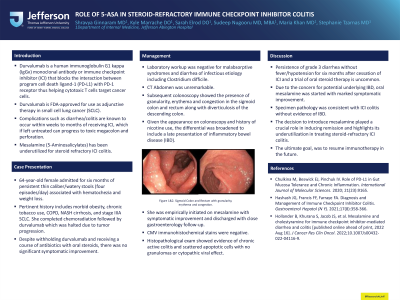Sunday Poster Session
Category: Colon
P0265 - Role of 5-Aminosalicylates in Steroid-Refractory Immune Checkpoint Inhibitor Colitis
Sunday, October 22, 2023
3:30 PM - 7:00 PM PT
Location: Exhibit Hall

Has Audio
- SG
Shravya Ginnaram, MD
Jefferson Abington Hospital
Abington, PA
Presenting Author(s)
Shravya Ginnaram, MD1, Kyle Marrache, DO1, Sarah Elrod, DO1, Sudeep Nugooru, MD, MBA1, Maria Khan, MD1, Stephanie Tzarnas, MD2
1Jefferson Abington Hospital, Abington, PA; 2Einstein Medical Center, Philadelphia, PA
Introduction: Durvalumab is a human immunoglobulin G1 kappa (IgG𝜅) monoclonal antibody or immune checkpoint inhibitor (ICI) that blocks the interaction between program cell death ligand-1 (PD-L1) with PD-1 receptor thus helping cytotoxic T cells target cancer cells. Durvalumab is FDA-approved for use as adjunctive therapy in small cell lung cancer (SCLC). Complications such as diarrhea/colitis are known to occur within weeks to months of receiving ICI, which if left untreated can progress to toxic megacolon and perforation. Mesalamine (5-Aminosalicylates) has been underutilized for steroid refractory ICI colitis.
Case Description/Methods: We present a case of a 64-year-old female admitted for six months of persistent thin caliber/watery stools (four episodes/day) associated with hematochezia and weight loss. Pertinent history includes morbid obesity, chronic tobacco use, COPD, NASH cirrhosis, and stage IIIA SCLC. She completed chemoradiation followed by durvalumab which was halted due to tumor progression. Despite withholding durvalumab and receiving a course of antibiotics with oral steroids, there was no significant symptomatic improvement. Laboratory workup was negative for malabsorptive syndromes and diarrhea of infectious etiology including Clostridium difficile. CT Abdomen was unremarkable. Subsequent colonoscopy showed the presence of granularity, erythema and congestion in the sigmoid colon and rectum along with diverticulosis of the descending colon. Given the appearance on colonoscopy and history of nicotine use, the differential was broadened to include a late presentation of inflammatory bowel disease (IBD). She was empirically initiated on mesalamine with symptomatic improvement and discharged with close gastroenterology follow-up. CMV immunohistochemical stains were negative. Histopathological exam showed evidence of chronic active colitis and scattered apoptotic cells with no granulomas or cytopathic viral effect.
Discussion: Persistence of grade 3 diarrhea without fever and hypotension for six months after cessation of ICI and a trial of oral steroid therapy is uncommon. Due to the concern for potential underlying IBD, oral mesalamine was started with marked symptomatic improvement. Specimen pathology was consistent with ICI colitis without evidence of IBD. Therefore, mesalamine may play a role in inducing remission in steroid-refractory cases of mild to moderate ICI colitis without systemic symptoms with a goal of resuming immunotherapy in the future.

Disclosures:
Shravya Ginnaram, MD1, Kyle Marrache, DO1, Sarah Elrod, DO1, Sudeep Nugooru, MD, MBA1, Maria Khan, MD1, Stephanie Tzarnas, MD2. P0265 - Role of 5-Aminosalicylates in Steroid-Refractory Immune Checkpoint Inhibitor Colitis, ACG 2023 Annual Scientific Meeting Abstracts. Vancouver, BC, Canada: American College of Gastroenterology.
1Jefferson Abington Hospital, Abington, PA; 2Einstein Medical Center, Philadelphia, PA
Introduction: Durvalumab is a human immunoglobulin G1 kappa (IgG𝜅) monoclonal antibody or immune checkpoint inhibitor (ICI) that blocks the interaction between program cell death ligand-1 (PD-L1) with PD-1 receptor thus helping cytotoxic T cells target cancer cells. Durvalumab is FDA-approved for use as adjunctive therapy in small cell lung cancer (SCLC). Complications such as diarrhea/colitis are known to occur within weeks to months of receiving ICI, which if left untreated can progress to toxic megacolon and perforation. Mesalamine (5-Aminosalicylates) has been underutilized for steroid refractory ICI colitis.
Case Description/Methods: We present a case of a 64-year-old female admitted for six months of persistent thin caliber/watery stools (four episodes/day) associated with hematochezia and weight loss. Pertinent history includes morbid obesity, chronic tobacco use, COPD, NASH cirrhosis, and stage IIIA SCLC. She completed chemoradiation followed by durvalumab which was halted due to tumor progression. Despite withholding durvalumab and receiving a course of antibiotics with oral steroids, there was no significant symptomatic improvement. Laboratory workup was negative for malabsorptive syndromes and diarrhea of infectious etiology including Clostridium difficile. CT Abdomen was unremarkable. Subsequent colonoscopy showed the presence of granularity, erythema and congestion in the sigmoid colon and rectum along with diverticulosis of the descending colon. Given the appearance on colonoscopy and history of nicotine use, the differential was broadened to include a late presentation of inflammatory bowel disease (IBD). She was empirically initiated on mesalamine with symptomatic improvement and discharged with close gastroenterology follow-up. CMV immunohistochemical stains were negative. Histopathological exam showed evidence of chronic active colitis and scattered apoptotic cells with no granulomas or cytopathic viral effect.
Discussion: Persistence of grade 3 diarrhea without fever and hypotension for six months after cessation of ICI and a trial of oral steroid therapy is uncommon. Due to the concern for potential underlying IBD, oral mesalamine was started with marked symptomatic improvement. Specimen pathology was consistent with ICI colitis without evidence of IBD. Therefore, mesalamine may play a role in inducing remission in steroid-refractory cases of mild to moderate ICI colitis without systemic symptoms with a goal of resuming immunotherapy in the future.

Figure: Figure 1. Sigmoid Colon with granularity, erythema and congestion.
Disclosures:
Shravya Ginnaram indicated no relevant financial relationships.
Kyle Marrache indicated no relevant financial relationships.
Sarah Elrod indicated no relevant financial relationships.
Sudeep Nugooru indicated no relevant financial relationships.
Maria Khan indicated no relevant financial relationships.
Stephanie Tzarnas indicated no relevant financial relationships.
Shravya Ginnaram, MD1, Kyle Marrache, DO1, Sarah Elrod, DO1, Sudeep Nugooru, MD, MBA1, Maria Khan, MD1, Stephanie Tzarnas, MD2. P0265 - Role of 5-Aminosalicylates in Steroid-Refractory Immune Checkpoint Inhibitor Colitis, ACG 2023 Annual Scientific Meeting Abstracts. Vancouver, BC, Canada: American College of Gastroenterology.
